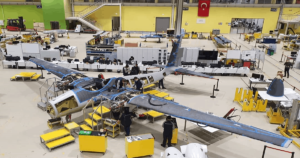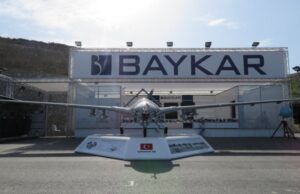
Turkish defense company Baykar intends to complete the construction of a plant near Kyiv in August 2025, the company’s CEO Haluk Bayraktar told Reuters.
“We have completed 80% of the construction and are now ordering vehicles. The date of production will be determined by the course of the war, but the facility will be ready in August 2025,” Bayraktar told the agency in an interview on Thursday.
The plant is expected to produce the TB2 or its heavier TB3 variant.
Baykar currently uses Ukrainian-made engines for its Akinci and Kizilelma drones. The company also recently signed an agreement with Ukraine’s Ivchenko-Progress to jointly develop a turbofan engine, Baykar said.
Over the next five years, Baykar will invest $300 million to develop a turboprop engine for the Akinci drone. This will be followed by the development of a turbofan engine for Kizilelma, an unmanned air-to-air combat vehicle currently undergoing flight testing.
Baykar will keep the capacity of the TB2 and Akinci production lines at the same level, and over the next few years will invest in the expansion of the TB3 and Kizilelma lines. The Kizilelma is expected to start mass production next year in the amount of 10 units. Baykar’s revenue last year was $2 billion, up from $1.4 billion the previous year, with 90% coming from foreign markets.
The company accounts for about a third of all Turkish exports of defense and aerospace products.
As previously reported, Turkish-made Bayraktar drones have gained wide popularity in the world after the Ukrainian military began using them to counter Russian troops, destroying armored vehicles and artillery systems. In February, it was reported that the Baykar plant in Ukraine would employ about 500 people and produce about 120 units per year.

Turkish defense company Baykar has begun construction of a plant near Kyiv that will employ about 500 people and produce TB2 or TB3 drone models, the company’s CEO told Reuters on Tuesday.
The Turkish-made Bayraktar drones gained widespread popularity worldwide after the Ukrainian military began using them to counter Russian forces, destroying armored vehicles and artillery systems.
Baykar said it has signed export agreements for its TB2 drone with 30 countries. Among them are Ukraine, Ethiopia, Libya and Azerbaijan since 2018, according to the SIPRI think tank.
“Our plant is under construction… we need about 12 months to finish the construction, and then we will move on to the internal machinery, equipment and organizational structure,” Baykar CEO Haluk Bayraktar said on the sidelines of the Riyadh World Defense Exhibition.
“The plant in Ukraine is large, we plan to employ about 500 people,” he said. Bayraktar noted that the production capacity will be about 120 units per year, but said it is not yet clear whether production at the Ukrainian plant will focus on the TB2 or TB3 drone model.
Asked if security issues related to the ongoing conflict would be a concern for the plant, he said that plans are “fully progressing” and “nothing” can stop them.
As reported earlier, Ukraine’s Defense Ministry and Turkish company Baykar Makina signed an agreement to build a service center for the repair and maintenance of unmanned aerial vehicles in Ukraine.

The Turkish manufacturer of drones Baykar is developing an investment project to build a research center for advanced technologies in aerospace engineering and a production center for drone assembly in Ukraine, Deputy Director General for Investments Natalya Ozden has said.
“Baykar intends to invest in Ukraine, and is currently developing a corresponding investment project,” she said during the International Defense Investment Forum in Kyiv.
According to her, the project provides for 100% investment by Baykar in the creation of a new research and development center, the creation of production facilities and drone assembly, as well as maintenance and repair shops with accompanying services.
At the same time, according to Ozden, there is a need for discussion about the incentives existing in Ukraine to support investors, in particular, those provided for by the laws on supporting projects with significant investments (the law on investment nannies) and on industrial parks.
“Investors want to come to Ukraine, and there are laws on supporting projects with significant investments, on industrial parks. But they do not work yet, we expect mechanisms for their implementation, and if we compare these projects, we see that the law on industrial parks provides more advantages than the law on investment projects,” she said.
She recalled that the law on investment nannies provides up to 30% of assistance from the state, but stressed that a foreign investor, when choosing a country for investment, compares several countries and opportunities, and chooses the most appropriate incentives for him.
Baykar was founded more than 30 years ago, and during this time has gone from a manufacturer of car parts to the world’s leading manufacturer of drones with 1,600 employees.